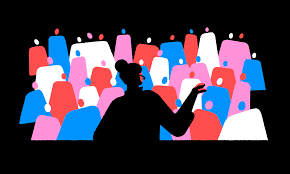What golf can teach fashion influencers about ownership. (surprisingly)
The one where I tie together pro-golf and the next Instagram. And web3, of course.
Threads notwithstanding, I think we can all agree there will be a new social media platform designed to enchant our eyeballs, further tie us to our phones, and ultimately introduce us to things we want to be, buy, or make.
I struggle to see how new entrants to the platform game will incentivize creators away from their current most-direct options, e.g., Substack or biggest, e.g., TikTok, etc., without espousing Web3 values of decentralization, transparency, and ownership. The delicate dance of negotiation will have a financial component, surely, maybe "equity" or ownership. New platforms will have to rewrite the value chain to drive enticing content to their platforms. See the recent merger of the PGA and LIV golf tours. Yes, I'm way out of my comfort zone here, BUT I think it'll be worth it.
TL;DR A Saudi investment group created a new golf tour and offered some superstar golfers gobs of money to join.
Slightly longer, totally cribbed from the All In Podcast, which my husband forces me to listen to on car rides.
An explanation of golfers and soccer players as content creators
Apparently, the PGA has a monopoly on golf. All the best players play there. So the Saudi Arabian Public Investment Fund created LIV Golf as an alternative. LIV Golf invested $2 billion and offered guarantees to golfers to join their tour. Notably, Tiger Woods reportedly received an $800 million guarantee offer, which he declined, while Phil Mickelson accepted a reported $200 million guarantee. Seven of the top 10 highest-paid golfers in the world signed up for LIV Golf, causing significant disruption to the PGA Tour's monopoly in professional golf.
Recently, it was announced that LIV Golf and the PGA Tour are merging, which seems like a no-brainer in retrospect, e.g., Tiger Woods should have taken the money offered by LIV Golf because then he would've gotten $800m and also ended up going back to the PGA post-merger. The rest of the podcast dives deeper into how pro-sports players are paid and should be paid in this environment. They also talk about Messi, a presumably (dunno) very good soccer/football player who has a new deal that involves pay from the team, pay from Apple, who has the streaming rights, and pay from Adidas, his sponsor, for the value he'll bring not only towards winning matches but for getting more fans to the sport of soccer/football in the US. You might say that they, Messi, Tiger, et al., are the content creators, and the platform is some combo of the TV networks and the leagues.
Players deserve equity as compensation for their labor in sports leagues/as content creators
It makes sense that the players should be equity holders in these platforms, presumably the leagues, as they bring a considerable proportion of the value. The value of watching golf tournaments (if we assume there is any, which for me there is most certainly not, but you get where I'm going) is watching the best of the best, Tiger, etc. Tiger should be compensated for this, more linearly than prize money and more directly than sponsorships. If he drives more eyeballs, the value of the whole tour goes up.
Similarly, great influencers, who suck you back in to see their content day after day as they story their way through their glamorous or quotidian lives, should also benefit from the value they are bringing, beyond their own sponsorship deals. The podcast called this the merging of capital and labor; these influencers' work is both their labor and their capital accrual.
OK, let's tie in Web3, decentralization, ownership, and transparency
How could influencers OWN equity in their platforms? This idea is a bit more complicated, as they often work across platforms. But I bet you can guess where my answer is going. Web3. Either a series of decentralized social media platforms (seems like a long shot, but there are certainly some Twitter/Threads competitors out there trying) or a decentralized way to own your audience becomes the de facto agreement between platforms and the best content creators. That is where the value is, the aggregated eyeballs to sell to advertisers, so in fact, these influencers would be getting a better deal than Tiger or Messi, who's getting a share in the American soccer league's (MLS?) profits in return for joining the Miami team. (name? dunno) Influencers who own their audience have the true ownership, decentralization, and transparency that Web3 espouses. You don't need blockchain or NFTs to build a better internet; you just need more opportunities to value different contributors appropriately.
Like what you’re reading?



